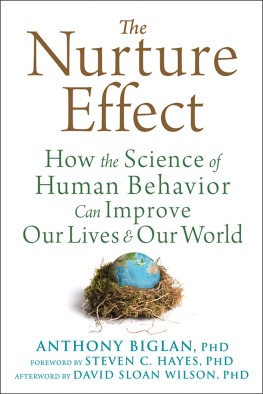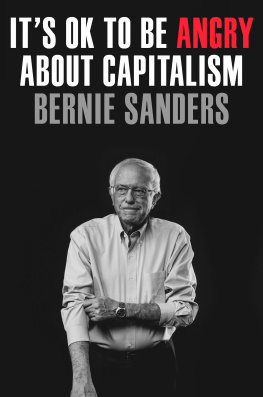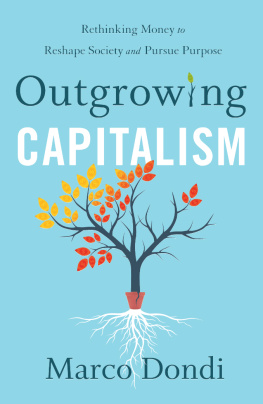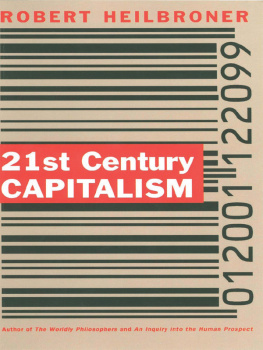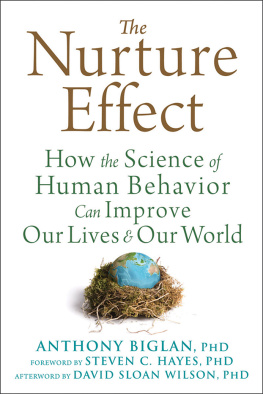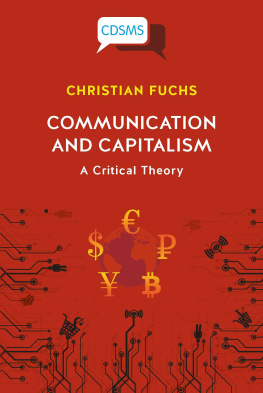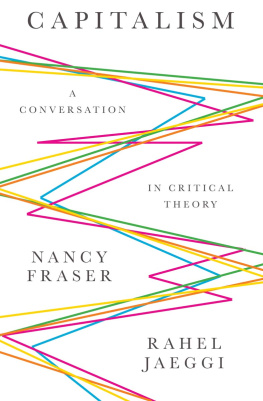Copyright 2020 by Anthony Biglan
All rights reserved, including the right to reproduce this book or portions thereof in any form whatsoever.
Published in the United States of America
by Values to Action
REBOOTING CAPITALISM/ANTHONY BIGLAN
www.tonybiglan.com
Cover art by David Gee
Interior design by Nita Ybarra
Book production by Judy Hicks
Values to Action
Eugene, OR
www.valuestoaction.com
Digital book(s) (epub and mobi) produced by Booknook.biz.
Foreword
I F YOU DIDNT think the world economy was broken before, then perhaps the coronavirus pandemic has convinced you. Somehow, all of the preexisting problemsthe havoc created by global warming, the hollowing out of the middle class, homelessness and mass incarceration, health problems that are perversely more prevalent in rich nations than poorbecome more urgent when they might result in us and our loved ones contracting a fatal disease.
Experts of all stripes are rushing to interpret the root of the problem and offer their solutions. The first thing you should know about Rebooting Capitalism is that its analysis lies totally outside the economics profession. Instead, it is based on the latest advances in evolutionary science and a tradition of pragmatic problem solving that stretches back to figures such as B.F. Skinner, John Dewey, and William James.
The author of Rebooting Capitalism, Anthony Biglan, is well qualified to step into the limelight during this pivotal period in world history. He is trained in the aforementioned pragmatic tradition and has a lifetime of experience making life better in real-world settings such as families, schools, and neighborhoods. He also played a significant role in the battle against the tobacco industry, which continues to be responsible for almost a half million deaths every year worldwide. His last book, The Nurture Effect, identifies nurturance as a master variable. Having it results in multiple assets. Not having it results in multiple deficits. If there could be a single policy prescription, it would be to increase nurturance in all its forms.
In Rebooting Capitalism, Biglan tackles the large-scale cultural forces that so often manifest as problems at smaller scales. Capitalism in its current form is a big part of the problem because it strongly reinforces practices that benefit some members of society but not society as a whole. The problem with capitalism in its current form is systemic. Its not a matter of greedy individuals exploiting the system. Nearly anyone placed within the current system will end up behaving in ways that subvert, rather than promote, the common good.
Systemic problems require systemic solutions. The next thing you should know about Rebooting Capitalism is that it affirms capitalism in a more enlightened form and also the basic values of democratic governance. This is especially important at a time when more-autocratic forms of governance are being touted as the only way of adapting to collective problems such as a global pandemic.
This is where modern evolutionary science becomes important as an analytic framework. Any process that combines the ingredients of variation, selection, and replication counts as an evolutionary process, regardless of whether it is genetic, cultural, or personal. And evolution doesnt make everything nice. It frequently results in outcomes that benefit me but not you, us but not them, or short-term gains but not the long view. Evolution will take place whether we want it to or not. Unless we learn how to wisely manage evolutionary processes, they will become the problem rather than the solution.
The first step toward managing an evolutionary process requires establishing the target of selection. The pandemic and problems that preceded it establish that the target of selection must be systemic and global. We must select our practices with the global good in mind. There is no invisible hand that converts lower-level interest into the higher-level common good.
The second step is to orient variation around the target of selection. It is here that the vibrancy of capitalism makes an essential contributionbut only if markets are constructed to produce the right outcomes. Otherwise, capitalism becomes part of the problem.
The third step is the identification and replication of best practices. This requires the rigorous gathering and sharing of information associated with scientific inquiry. Also, replication must be sensitive to context. What works here will often require adjustments to work there. It is necessary to experiment, experiment, experiment at all scalesand experimentation is nothing other than a highly managed form of cultural evolution.
Rebooting capitalism will be a daunting challenge, but the first step is to have a clear sense of what to do. That is what Biglan conveys in this book, drawing upon a wealth of experience and a theoretical foundation that is far more authoritative than mainstream economics. Reading it is your own next step toward becoming part of the solution.
David Sloan Wilson, president, Evolution Institute
Introduction
A MERICA IS IN trouble. In the White House, we have a man who almost certainly will go down in history as our worst president. He has appointed many incompetent people, most of whom are working to make matters worse for the majority of Americans and ultimately for the entire planet.
But the Trump presidency is not an aberration, wholly unrelated to what came before. For nearly fifty years, our country has been going downhill. We are the most economically unequal of the developed countries, and the disparity in wealth and income continues to grow. The wealthiest have gained a stranglehold on policy making and economic gains. Millions of people have fallen out of the middle class. Drug overdoses, the tragic endpoint of hopelessness and desperation, have killed more Americans than died in all the years of the Vietnam War.
We are doing a terrible job of ensuring that the next generation of Americans thrives. About 20 percent of our children are growing up poor, but effective family and school interventions are reaching only a tiny proportion of the young people who would benefit. As a result, we continue to have far higher levels of crime, delinquency, substance abuse, depression, and academic failure than we otherwise would likely have.
And we are fighting with each other. We argue about politics, climate change, inequality, and health care. Racists are so emboldened that they say things publicly that would have been unthinkable, or at least said only in private, ten years agoand they encounter approval rather than reproach. Certainly, gains have been made for the rights of women, LGBTQ people, and members of ethnic minority groups in recent decades. Yet even these gains now appear to be in jeopardy. We seem helpless to resolve any of our major conflicts. We talk mostly to those who agree with us, and we attack, criticize, and vilify those who dont think as we do.


